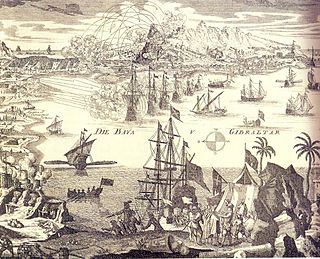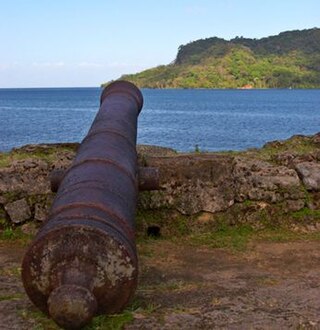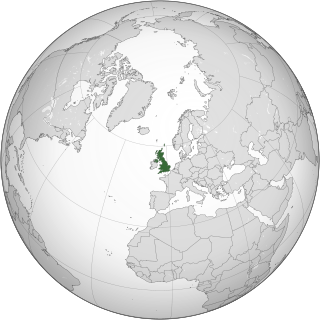
The War of Jenkins' Ear was fought by Britain and Spain between 1739 to 1748. The majority of the fighting took place in New Granada and the Caribbean Sea, with major operations largely ended by 1742. It is considered a related conflict of the 1740 to 1748 War of the Austrian Succession.

Sir Henry Morgan was a Welsh privateer, plantation owner, and, later, Lieutenant Governor of Jamaica. From his base in Port Royal, Jamaica, he and those under his command raided settlements and shipping ports on the Spanish Main, becoming wealthy as they did so. With the prize money and loot from the raids, Morgan purchased three large sugar plantations on Jamaica.

Admiral of the Blue Edward Boscawen, PC was a British admiral in the Royal Navy and Member of Parliament for the borough of Truro, Cornwall, England. He is known principally for his various naval commands during the 18th century and the engagements that he won, including the siege of Louisburg in 1758 and Battle of Lagos in 1759. He is also remembered as the officer who signed the warrant authorising the execution of Admiral John Byng in 1757, for failing to engage the enemy at the Battle of Minorca (1756). In his political role, he served as a Member of Parliament for Truro from 1742 until his death in 1761 although, due to almost constant naval employment, he seems not to have been particularly active. He also served as one of the Lords Commissioners of the Admiralty on the Board of Admiralty from 1751 and as a member of the Privy Council from 1758 until his death.

The Anglo-Spanish War was a conflict between the English Protectorate and Spain between 1654 and 1660. It was driven by the economic and religious rivalry between the two countries, with each side attacking the other's commercial and colonial interests in various ways, such as privateering and naval expeditions.
Anglo-Spanish War may refer to:

Portobelo is a historic port and corregimiento in Portobelo District, Colón Province, Panama. Located on the northern part of the Isthmus of Panama, it is 32 km (20 mi) northeast of the modern port of Colón now at the Atlantic entrance to the Panama Canal. It has a population of 4,559 as of 2010, and functions as the seat of Portobelo District.

The Treaty of Seville was signed on 9 November 1729 between Britain, France, and Spain, formally ending the 1727–1729 Anglo-Spanish War; the Dutch Republic joined the Treaty on 29 November.
Events from the year 1739 in Great Britain.

The Anglo-Spanish War of 1727–1729 was a limited war that took place between Great Britain and Spain during the late 1720s, and consisted of a failed Spanish attempt to capture Gibraltar and an unsuccessful British Blockade of Porto Bello with a high British death toll. It eventually ended with a return to the previous status quo ante bellum following the Treaty of Seville.

The Blockade of Porto Bello was a failed British naval action against the Spanish port of Porto Bello in present-day Panama between 1726 and 1727 as part of the Anglo-Spanish War. The British were attempting to blockade the port to stop the Spanish treasure fleet leaving for Spain with its valuable cargo. However tropical disease took its toll of the seamen to the extent that the British had to leave to re-crew, during which time the Spanish were able to re-commence shipping operations.
Vice Admiral Francis Hosier was a British naval officer. He was a lieutenant on Rooke's flagship at the Battle of Barfleur in 1693. He captured the Heureux off Cape Clear in 1710 and distinguished himself in action with the Spanish off Cartagena in 1711. He is chiefly remembered, however, for his role in the failure of the Blockade of Porto Bello, for which poor Government orders were largely responsible, during which he died of disease alongside thousands of his sailors.

HMS Burford was a 70-gun third rate ship of the line of the Royal Navy, built at Deptford Dockyard to the 1719 Establishment, and launched on 19 July 1722. Burford was notably the early posting of both John Forbes and John Byng, both of whom rose to become admirals.

The Battle of Porto Bello, or the Battle of Portobello, was a 1739 battle between a British naval force aiming to capture the settlement of Portobelo in Panama, and its Spanish defenders. It took place during the War of the Austrian Succession, in the early stages of the war sometimes known as the War of Jenkins' Ear. It resulted in a popularly acclaimed British victory.
True Caribbean Pirates is a documentary that aired on the History Channel in 2006.

Spain–United Kingdom relations, also called Spanish–British relations, are the bilateral international relations between Spain and the United Kingdom. Both countries are members of the Council of Europe and NATO. Spain is a European Union member and the United Kingdom is a former European Union member.

Latin America–United Kingdom relations are the diplomatic, economic and cultural relations between the United Kingdom and the countries of Latin America.

Colombia–United Kingdom relations are the bilateral and diplomatic relations between Colombia and the United Kingdom. Colombian-Anglo relations begin in 1810, and stem from the end of the Napoleonic Wars in 1815 and the service of the British Legions who helped Colombia to win independence through Simón Bolívar's campaign to liberate New Granada in 1819–1820. However the first known English person to have traveled to modern day Colombia was Sir John Hawkins in 1565.

Henry Morgan's raid on Porto Bello was a military event which took place in the latter half of the Anglo-Spanish war beginning on 10 July 1668. Notable Welsh Buccaneer Henry Morgan led a largely English Privateer force against the heavily fortified town of Porto Bello. After landing Morgan and his men attempted to take the castles protecting the town. One such involved using captured citizens as human shields to seize one of the castles. After capturing them all by force the privateers subsequently entered the city and then plundered it before Morgan demanded a large ransom from the Governor of Panama Don Agustín de Bracamonte. While the negotiations for this was going on – Bracamonte led a sizeable force from Panama City intent on recapturing the city and putting the privateers to the sword.

Henry Morgan's raid on Puerto del Príncipe was a military event which took place during the latter stage of the Anglo-Spanish War between March and April 1668 on the Spanish island of Cuba. Some 700 Buccaneers in twelve ships led by Captain Henry Morgan landed in the Gulf of Santa María and marched to capture the inland town of Puerto del Príncipe.













